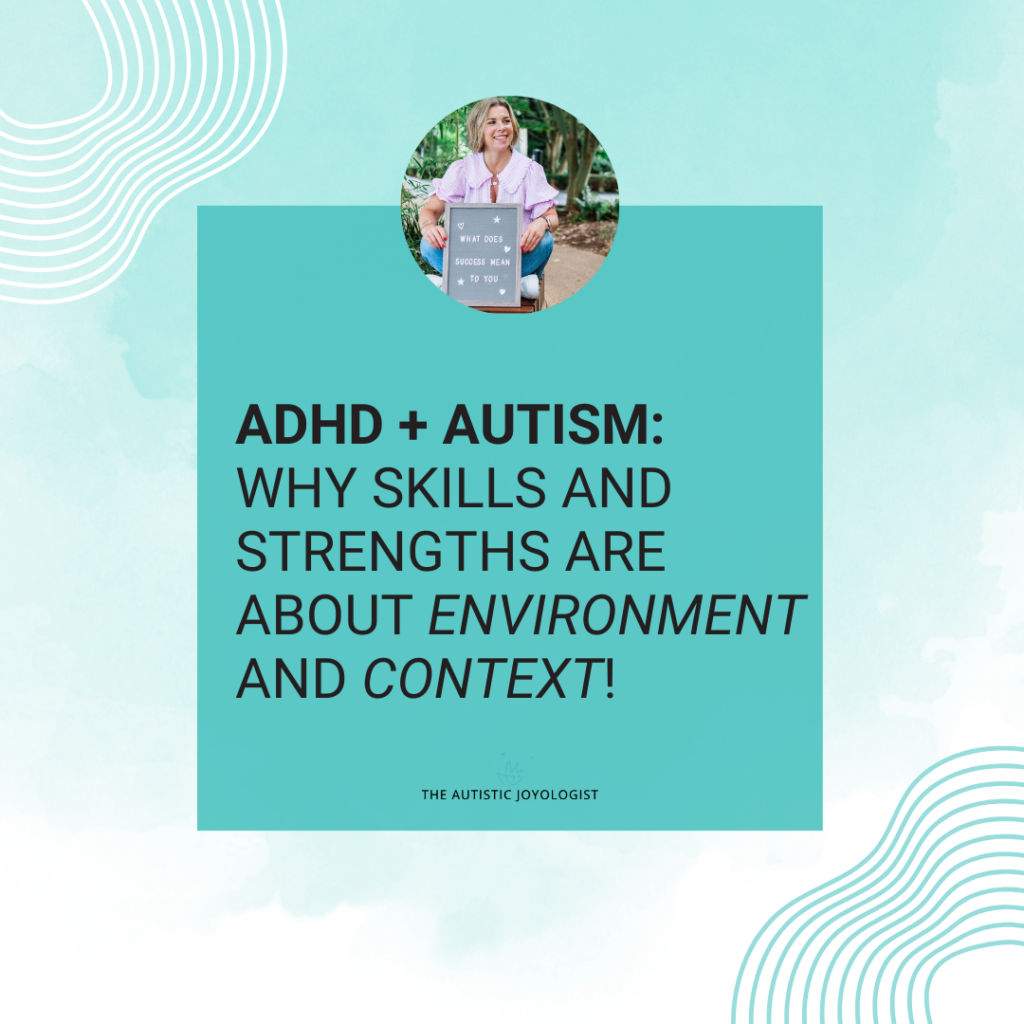
Something’s become apparent to me since my autism and ADHD diagnosis in my mid-40s.
It revolves around skills and strengths, and how environment and context come into play. Areas I often felt were my failings or weaknesses, or skills I lacked during my corporate time, are actually my strengths in terms of the success I’ve had as an entrepreneur.
What do I mean by skills and strengths in terms of ADHD and Autism, environment and context?
Well…
You wouldn’t judge a fish by its ability to climb a tree or a cat by its ability to swim – agreed?
With that in mind, your skills and talents should be measured in terms of the environment and the right context.
Thinking back, I had a lot of negative feedback about areas I needed to improve and things I was weak at – that started in school and was one of the biggest issues.
We have it drummed into us from a very young age that we’re supposed to be good at a certain number of skills.
We’re taught them and are meant to have an average ability across all of them.
However, research shows that autistic and ADHD people tend to have spiky profiling – some areas we really, really excel in, but at the opposite end, we find others more challenging.
We don’t have the same ability to do everything at an average level.
The school system doesn’t support that.
In an attempt to make us all average, we receive negative feedback about the things we can’t do as well as other children.
That carries on into adult life.
For example, my experience within corporate organisations was being expected to have a certain level of skills I didn’t have.
That led me to feel ashamed of things I couldn’t do and hide areas I found difficult.
On top of that, I suffocated the skills and talents I do have.
That was the real bitter sting for me: the realisation I‘d covered up areas I excelled in.
I worked at places where sameness was celebrated, but my ADHD and Autism meant I am very different to the expected sameness.
The way you deal with problems within corporate organisations is a process, whereas my brain uses creative problem-solving.
What does that mean?
If something isn’t working as efficiently as it could, my brain comes up with new ways and ideas.
That was very much rejected in a corporate context. I used to feel I was always underperforming and underdelivering, and that was certainly the feedback from my management teams.
But actually, take creative problem-solving out of the corporate arena and put it in the context of being an entrepreneur and running my own businesses, and it’s my strength.
It all goes back to the environment and context.
Something I believed was a weakness or an inability is the opposite in the right environment and context. As an innovative entrepreneur, creative problem-solving – looking for new ways of delivering services or going above and beyond what’s already available in the market – is a strength.
Do you have ADHD and Autism? And do you have skills that maybe you haven’t realised are your strengths?
Or like me, maybe you believed they were weaknesses?
If you use them in the right environment and context, would they really be your strengths?
I’d like to give you another example…
I’m quite sensitive and an emotional person.
Throughout childhood, personal relationships, friendships, and in the corporate world, I often received feedback about being overly sensitive – taking things too much to heart.
Now, I do struggle with rejection sensitive dysphoria (RSD), so even the slightest perceived criticism or negative feedback has caused me to spiral. I have more of a handle on my RSD now, but previously, I was very emotional.
That was always fed back as a negative and a weakness. I was acutely aware of it and tried to deal with it on my own.
But in the context of what I do now as The Autistic Joyologist, being attuned to other people’s emotions is an absolute strength.
It allows me to connect better with my clients, have empathy, and a different perspective and understanding.
Very often, I get a sense of people’s moods or feelings just by being in their presence. Being sensitive and emotional is actually a strength in the right environment and context.
What are your thoughts?
Is there something you’ve previously considered a failing or a missing skill that you now realise is a strength in another environment?
I’d love to hear your story.
By sharing, we unravel some of the negative programming that starts early on – often in school.
There’s nothing broken about any of us; we just have different skills and abilities, and in the right environment, they’re an absolute asset. It’s about finding ways to use our own unique skills in a positive way.
If you’d like support understanding your skill set, my Neurodivergent Skills Mastery course could be for you, helping you create a happier and more successful life for yourself.
Nikki x